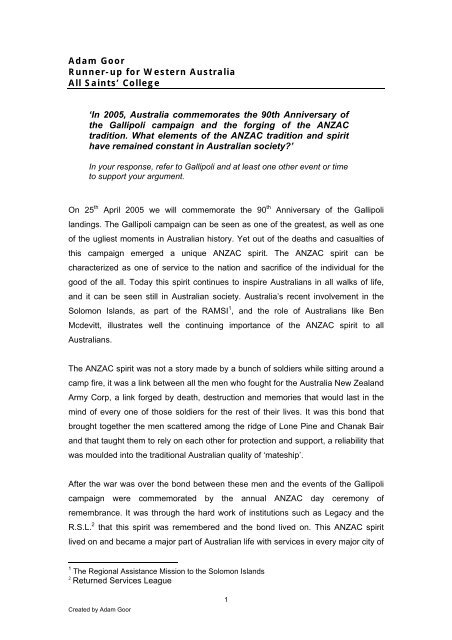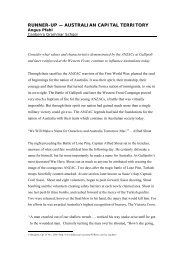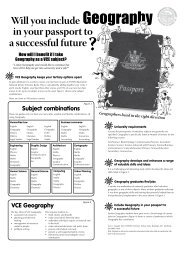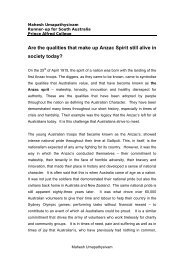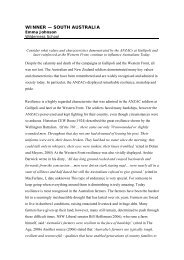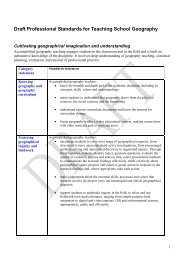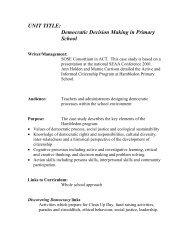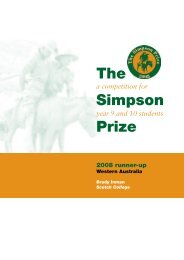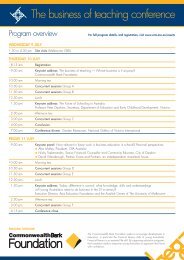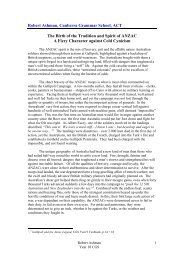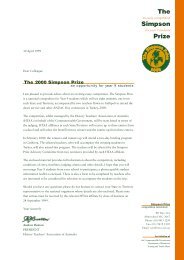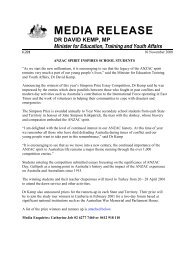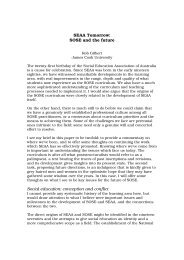Adam Goor Runner-up for Western Australia All Saints ... - afssse
Adam Goor Runner-up for Western Australia All Saints ... - afssse
Adam Goor Runner-up for Western Australia All Saints ... - afssse
You also want an ePaper? Increase the reach of your titles
YUMPU automatically turns print PDFs into web optimized ePapers that Google loves.
<strong>Adam</strong> <strong>Goor</strong><br />
<strong>Runner</strong>-<strong>up</strong> <strong>for</strong> <strong>Western</strong> <strong>Australia</strong><br />
<strong>All</strong> <strong>Saints</strong>’ College<br />
‘In 2005, <strong>Australia</strong> commemorates the 90th Anniversary of<br />
the Gallipoli campaign and the <strong>for</strong>ging of the ANZAC<br />
tradition. What elements of the ANZAC tradition and spirit<br />
have remained constant in <strong>Australia</strong>n society?’<br />
In your response, refer to Gallipoli and at least one other event or time<br />
to s<strong>up</strong>port your argument.<br />
On 25 th April 2005 we will commemorate the 90 th Anniversary of the Gallipoli<br />
landings. The Gallipoli campaign can be seen as one of the greatest, as well as one<br />
of the ugliest moments in <strong>Australia</strong>n history. Yet out of the deaths and casualties of<br />
this campaign emerged a unique ANZAC spirit. The ANZAC spirit can be<br />
characterized as one of service to the nation and sacrifice of the individual <strong>for</strong> the<br />
good of the all. Today this spirit continues to inspire <strong>Australia</strong>ns in all walks of life,<br />
and it can be seen still in <strong>Australia</strong>n society. <strong>Australia</strong>’s recent involvement in the<br />
Solomon Islands, as part of the RAMSI 1 , and the role of <strong>Australia</strong>ns like Ben<br />
Mcdevitt, illustrates well the continuing importance of the ANZAC spirit to all<br />
<strong>Australia</strong>ns.<br />
The ANZAC spirit was not a story made by a bunch of soldiers while sitting around a<br />
camp fire, it was a link between all the men who fought <strong>for</strong> the <strong>Australia</strong> New Zealand<br />
Army Corp, a link <strong>for</strong>ged by death, destruction and memories that would last in the<br />
mind of every one of those soldiers <strong>for</strong> the rest of their lives. It was this bond that<br />
brought together the men scattered among the ridge of Lone Pine and Chanak Bair<br />
and that taught them to rely on each other <strong>for</strong> protection and s<strong>up</strong>port, a reliability that<br />
was moulded into the traditional <strong>Australia</strong>n quality of ‘mateship’.<br />
After the war was over the bond between these men and the events of the Gallipoli<br />
campaign were commemorated by the annual ANZAC day ceremony of<br />
remembrance. It was through the hard work of institutions such as Legacy and the<br />
R.S.L. 2 that this spirit was remembered and the bond lived on. This ANZAC spirit<br />
lived on and became a major part of <strong>Australia</strong>n life with services in every major city of<br />
1 The Regional Assistance Mission to the Solomon Islands<br />
2 Returned Services League<br />
Created by <strong>Adam</strong> <strong>Goor</strong><br />
1
<strong>Australia</strong> with it also serving to inspire many members of the <strong>Australia</strong>n defence <strong>for</strong>ce<br />
in later conflicts such as World War Two, The Korean and Vietnam Wars, Borneo,<br />
Malay, Iraq and the Persian Gulf. As well as conflict there are also glimpses of the<br />
ANZAC spirit in rehabilitation and peace-keeping missions by ordinary <strong>Australia</strong>ns. a<br />
good example of this being the work of <strong>Australia</strong>n police personnel as well as<br />
diplomats in the Solomon Islands.<br />
The Solomon Islands were once a British colony, much like <strong>Australia</strong>. In 1987 the<br />
islands achieved their independence, becoming a nation of the Commonwealth. The<br />
Solomon Islands flourished with strong links between itself and the other members of<br />
the Asia-Pacific region 3 . Alas this had changed by 2002 with the nation becoming a<br />
‘failed state’ being on the border of subsiding. The government had lost almost all of<br />
its power with the new law en<strong>for</strong>cement being by way of armed street gangs. Civil<br />
war was on the brink of taking over the nation. Many serious crimes such as rape,<br />
murder and arson were being committed with no punishment at all. Many of the<br />
people living in the towns were subject to many violent and lawless acts with no sign<br />
of them ceasing. Many towns were overrun and controlled by gangs. It was as<br />
though there was no respect <strong>for</strong> the law, let alone the government. Due to this<br />
overriding of the democratic peacefulness that had existed once, s<strong>up</strong>plies of food,<br />
medicine and clothing were few. The pain and suffering spread throughout the<br />
nation. Having this happen so close to home, <strong>Australia</strong> in unison with ten other<br />
countries decided to act. It was at this point in time that the intervention <strong>for</strong>ce named<br />
RAMSI 4 was created. RAMSI, meaning Regional Assistance Mission to the Solomon<br />
Islands led by <strong>Australia</strong>n Diplomat Nick Warner set about restoring law and<br />
democracy to the troubled land.<br />
In July 2003, 2000 police and service personnel landed in Honiara 5 as part of<br />
RAMSI. They had a mission, a mission to make safe the city of Honiara and disarm<br />
the population, as well as restoring the rule of law. Ben Mcdevitt, co-ordinator of the<br />
police contingent of the RAMSI <strong>for</strong>ce was to play an important role in this mission<br />
and the achievement of RAMSI’s initial goals. Being the general manager of the<br />
national operations unit in the <strong>Australia</strong>n Federal Police as well as his co-ordination<br />
3<br />
The Commonwealth of Nations is an association of nations <strong>for</strong>merly ruled by Britain. It is headed by<br />
Queen Elizabeth II and has its headquarters in London. Today it aims to promote shared democratic<br />
and cultural values among those nations that were <strong>for</strong>merly British colonies.<br />
4<br />
RAMSI includes; <strong>Australia</strong>, New Zealand, Samoa, Tonga, Papua New Guinea, Vanuatu, Fiji,<br />
Micronesia, Marshall Islands and Kiribati.<br />
5<br />
Capital city of the Solomon Islands since 1978<br />
Created by <strong>Adam</strong> <strong>Goor</strong><br />
2
of the initial investigations of the Bali bombings Mcdevitt was chosen straight away to<br />
fill this role. Due to his success in completing this task Mcdevitt was awarded the<br />
Order of <strong>Australia</strong> in 2002. Although he had experience in many similar situations<br />
Mcdevitt found himself in one of the most challenging roles of his life. After<br />
completing the base tasks of RAMSI it was Mcdevitt’s job to re-establish the Royal<br />
Solomon Islands Police Force into the respectable position it had once had. In this<br />
role it was Mcdevitt’s job to identify, disarm and dismiss those police officers who had<br />
broken the law or conspired to do so. Mcdevitt knew that this would be a dangerous<br />
and demanding task due to the limited resources of RAMSI but it also occurred to<br />
him that significant national interests were at stake <strong>for</strong> <strong>Australia</strong>. After an interview<br />
with General Cosgrove Mcdevitt felt that he had to take on this role, he had no choice<br />
if the national interests were at stake.<br />
Within the first few weeks Ben and the other members of RAMSI were making a<br />
difference with most towns ridden of drunks, criminals and extortionists as well as<br />
police officers who had acted illegally. During time spent working with RAMSI Ben<br />
Mcdevitt came across all sorts of people and places, with his <strong>for</strong>ces confiscating<br />
three thousand, seven hundred and thirty guns, and seven hundred high powered<br />
military style weapons were confiscated as well as many other ordinary style<br />
weapons which is a very large number <strong>for</strong> a nation with a population of around four or<br />
five hundred thousand people. Since that time there has been very few guns fired in<br />
anger and very few fatalities due to gunfire. On top of that the Solomon Islands are<br />
starting to regain a respectable name and a respectable way of life.<br />
Although it has been nearly ninety years since the Gallipoli campaign and the time of<br />
the original ANZACs there is a spirit that lives on. A spirit shown by most that<br />
represent the nation of <strong>Australia</strong>. When Alec Campbell died in May 2002 it was not<br />
the end of the ANZAC legacy, it was just the beginning. It is clear that in today’s<br />
society that ANZAC spirit lives on, in the mateship shown between <strong>Australia</strong>ns and<br />
their allies, as well as sacrifice of ones self <strong>for</strong> the good of the nation. When death<br />
and destruction are all around the young people of today’s society keep a level head<br />
and remember their ancestors who put themselves on the line to give us the great<br />
nation today and it inspires them. It inspires them to do their best in all situations and<br />
to make sure that the suffering and heartache of all the men and women who died in<br />
the war as well as their loved ones was not in vain. When the nation stops and<br />
remembers on the 25 th of April 2005 it is my hope that the people of <strong>Australia</strong> do not<br />
Created by <strong>Adam</strong> <strong>Goor</strong><br />
3
just remember the ANZACs who started the legacy but also the many men and<br />
women of today who keep the spirit alive.<br />
Created by <strong>Adam</strong> <strong>Goor</strong><br />
4
Bibliography.<br />
Books.<br />
Cannon, M., Chronicles of <strong>Australia</strong>n Contemporary History, Longman, Melbourne,<br />
2001.<br />
Cotter, R., Change and Continuity in 20 th Century <strong>Australia</strong>, Macmillan, Melbourne,<br />
1998.<br />
Murray, B., Crisis, Conflict and Consensus, Rigby, Sydney, 1984.<br />
McKernan, M., The <strong>Australia</strong>n People and the Great War, Collins, Sydney, 1984.<br />
Rickard, J., <strong>Australia</strong>: A Cultural History, Longman, Melbourne, 1988.<br />
Ward, R., Concise History of <strong>Australia</strong>, UQP, Brisbane, 1990.<br />
Internet Sites.<br />
http://www.abc.net.au/austory/content/2004/s1227379.htm<br />
http://www.ausaid.gov.au/hottopics/solomon/solomons_ramsi_details.cfm<br />
http://www.bigirishgit.com/Features/solomons/solomons.htm<br />
Created by <strong>Adam</strong> <strong>Goor</strong><br />
5


